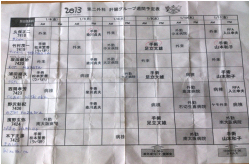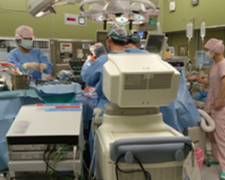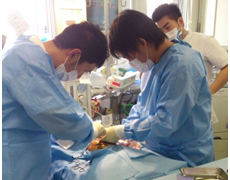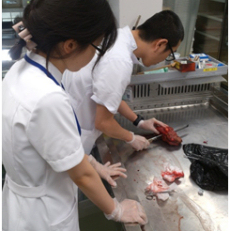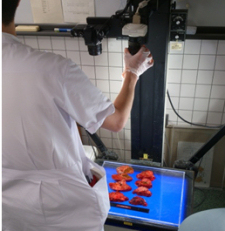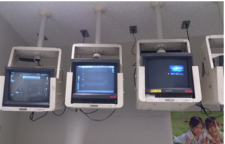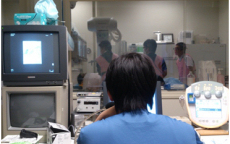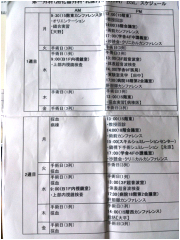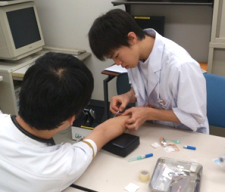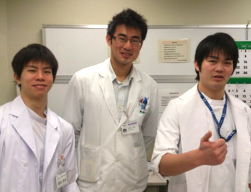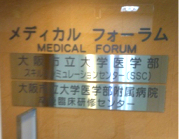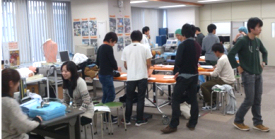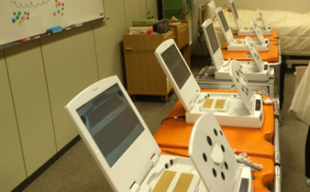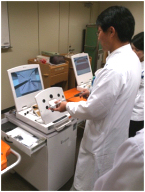Report:Taipei Medical University, medical department(台北医科大学)
Clinical Training report in Osaka City University Hospital
Chen Yu-Hung

Taiwan
Country
Taipei Medical University, medical departmen
School
2013/01/7-01/18 Hepato-biliary pancreatic surgery
2013/01/21-02/01 Gastric-enterologic surgery
2013/01/21-02/01 Gastric-enterologic surgery
Elective period
Hepato-biliary pancreatic surgery
It’s my first time to come into Japanese hospital; especially I can only speak little Japanese language. Fortunately, professor Kubo, the leader of the department is very kind and funny, and he take me to the station and introduce me to every membrane. Every doctor is also willing to teach me even with little English with body language or sometimes by drawing.There are operation days at Monday, Wednesday and Friday. The schedule in the other days is following doctors to practice procedures or sonography and percutaneous- transhepatic cholangial drainage (PTCD).
Liver team here is hard-working; it mostly takes 4 to 5 hours or even longer to finish one surgery. During my staying, there is one operation from 9:00 am to 11:00 pm. It is a case of cholangiocarcinoma which the operation is right lobectomy of liver with hepatojujenostomy and Roux-en Y reconstruction. It is my first time to stay such long time in the operation room, and I did learn a lot from the case. After the surgery, I went back to the textbook to review this disease, and it is very rare in Taiwan, so I think it’s lucky for me to see this operation and I may remember it for life-long time. The thing fresh to me is that the sonography and PTCD are all done by self-department, which is quite different from Taiwan, in where the surgeon will consult the physician to perform and just read the reports. I think the way in Japan is more helpful for resident’s training, because you can learn to approach patient rather than waiting for physician’s suggestion.
I follow the doctors to see the PTCD or sonography while there is no operation. They tell us how the characters of the images should be and the way to perform such procedures. PTCD is more invasive; therefore, we just observe from the outside and watch the monitor.
In this department, I see many kinds of cases which are rare in Taiwan. There is an infant with congenital biliary atresia status post liver transplantation from his father. Another case is Chinese female, Miss Won, suffered from intrahepatic stone for more than 30 years. In China, there is no doctor dare to perform operation for her, and her daughter in Osaka asks her to come here. During my staying, she has persistent bile leak due to post-operation healing is not good. By the time I visited her, she was so glad and excited to have one to speak Chinese. She always praises the doctors here is well-skilled and friendly, and so does all medical stuffs. I’m so glad to meet with her and wish her to recover as soon as possible. According to my Japanese group-mate, she said this department is one of the most hardworking departments; therefore, I really admire their determination and endurance. I also thanks for their patient to teach me. This department also has a welcome party for me, and everyone enjoys these moments. Professor Kubo is also nice and easy to get along, and I won’t be nervous talking to him. I will definitely treasure this experience for my lifetime.
Gastric-enterologic surgery
My last two weeks is in the Gastric-enterologic surgery, in where I got lots of opportunity to practice surgical skill clinically. My first day morning here is suture and tying training. The students here are also permitted to perform some feasible procedures under the doctors’ supervision, and the policy in this department is to encourage students to experience such things, and which are benefit to us. Therefore, I practice suture on the table, draw blood from the patient and insert Foley-tube during my training, although I’ve ever done these in Taiwan, these are still fresh to me since there are some difference in details. During my staying, my teacher is doctor Nishimura(西村), who is funny and friendly. All students like him. We follow doctor Nishimura to join the operations and pan-endoscope. It is also fresh to me that pan-endoscope is performed by self-department since we often transfer to physician in Taiwan. We follow doctors to see how they insert the tube into patient’s mouth and how they recognize the structure inside the digestive tract.The first surgery department in Japan is similar to the general surgery department in Taiwan, which includes various kind of specialty in different organs. I joined the digestive-tract team mostly, with the student Hamada(濱田). He was very friendly and always tried to translate for me. In here, we often have chances to go to medical forum for review the procedure. This is the place I think that our hospital worth of learning. Actually, Taiwan will begin the OSCEs test from this year to improve medical students’ clinical skill and reform the medical education system in the following years. In our school, there is also OSCE center similar to one in Osaka, but not regularly open to all students. Recently, the fourth grade students in Japan are going to have examination in February, so the medical forum is full of people who learn to improve clinical skills.
The students already in clinical practicing can also come here to review or have classes. For instance, we come here for two times; once to have the class about endoscope practicing, and the other is to practice drawing blood. You should record the using time first and then there will be a researcher to prepare the things you need. After practicing, you clean up the things and the researcher will question you if you are satisfied or fully understand or not. I think it is a good model for Taiwan hospitals to expand their centers to certain level.
Conclusion
Time elapses extremely fast. Four weeks training is plentiful and multiple. I do learn a lot from every professor, doctor and classmate. I also figure out some common and difference between Taiwan and Japan. At beginning, I am worried about the language barrier might be big problem and many friends also ask me about that. It turns out that Osaka people are enthusiastic and friendly; I got lots of help from the classmates, student officer-Miss Aoki and doctors. They accompany us to go traveling, have a welcome party and farewell party, and try to make me comfortable during staying. I will definitely be contact with them and do the same while they come to Taiwan!I am so glad I choose here to take exchange program. It must be a precious memory in my life and I will cherish it. Thanks again!
Chen Yu-Hung
Feb 1st .2013










